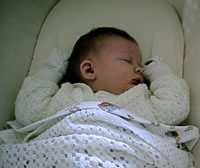Parents are subconsciously selecting names that linguistically portray their children as, in the case of boys, bigger and stronger, or, in the case of girls, more  feminine and petite.
feminine and petite.
That's the conclusion of a research team led by Alan McElligott who, together with his colleagues at Queen Mary University of London, analysed the top 50 most popular boys and girls names for newborns from England, Australia (NSW) and the US.
Linguists and sound scientists have shown in the past that individuals, including babies as young as 4 months old, judge words - and even made-up words - that have a lower vowel sound, like "maximum", to represent something that is bigger; conversely, words that contain high-sounding vowels that tend to be formed towards the front of the mouth - like "minimum" - tend to be regarded as representative of smaller things.
And in nature the same rules apply. Amongst animals, high pitched bleats, whines or calls tend to be used socially and to indicate friendly intent, while lower-pitched growls or roars are usually associated with aggression; the presumed reason being that a lower-pitched sound is judged to come from a bigger voicebox and hence must be inside a bigger stronger animal.
Tests on humans have shown that hearing a deeper voice in males tends to make people think of a bigger, stronger stature and hence better reproductive odds.
So, the Queen Mary team hypothesised that parents might be unwittingly adopting the same principle when naming their children, choosing names for boys that are dominated by a low vowel sound and names for girls containing a higher, sweeter sounding vowel.
By looking at English, Australian and US birth records and marrying up the most popular names with the way in which they would be pronounced locally, the team have found a highly significant association between boys names and lower vowel sounds - like Michael, and higher sounds for girls names, like Michelle.
However, the observation may not be universal. The team acknowledge in their paper, published in PLoS One, that they have looked only at English speaking nations so far. Other nationalities, or cultures, they say, might be completely different.
"We want to look at that question," says McElligott, because quite the reverse might be true in other languages. For instance, he highlights Africa cultures, where, compared with Western societies that tend to favour thinner female physiques, larger-sized, well-nourished women are preferred. Among these groups, bigger-sounding female names might be more popular.
"We won't know until we look," McElligott cautions. "We're hoping that this paper will stimulate a lot of work in this area, which no one has explored before. I normally work on the sounds that goats make, so this is a new departure for me!"










Comments
Add a comment